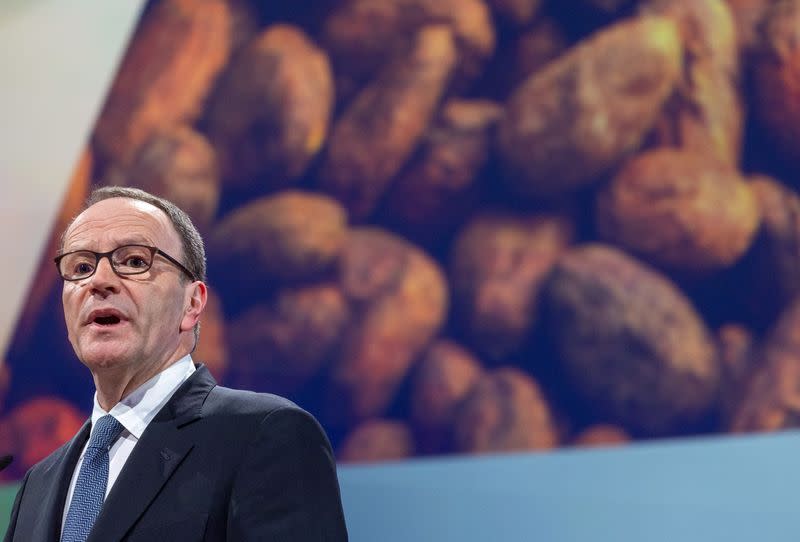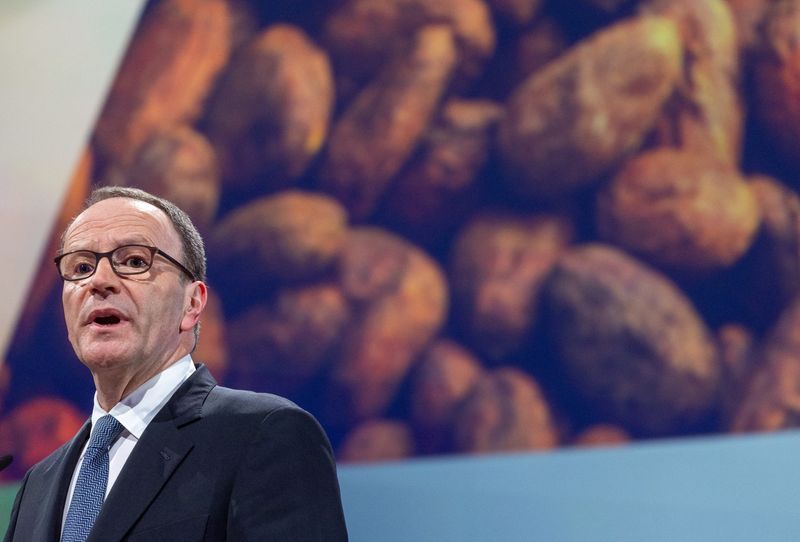By John Revill and Richa Naidu
ZURICH/LONDON (Reuters) – Nestle CEO Mark Schneider has been abruptly sacked by the world's largest food maker over the group's disappointing performance, three sources familiar with the matter told Reuters on Friday.
Nestle announced Schneider's departure late Thursday night after a board meeting and named company veteran Laurent Freixe as the new CEO, ending a nearly eight-year tenure for Schneider, a 58-year-old German who was the first outsider to lead Nestle in nearly a century.
The company declined to provide further details beyond comments made Friday during an investor call, in which Chairman Paul Bulcke said the board had assessed the current circumstances with Schneider and had jointly decided to make the change.
Schneider did not immediately respond to Reuters requests for comment.
Bernstein analyst Bruno Monteyne said Schneider had recently made it clear he expected to stay on for a long time.
The sudden move “is another sign that this is not a planned transition. It is clearly not his choice either, otherwise he probably would have had a smoother transition,” he said.
Nestlé shares hit a record high in January 2022 as the group enjoyed a pandemic-driven rebound. However, they have been falling since May 2023 amid a series of setbacks, disappointing earnings and downward revisions to guidance.
Nestlé’s price-to-earnings ratio, which measures the relative value of a company’s shares, stands at 17.7, down from more than 25 in June 2022. That’s higher than the consumer goods industry average of 10, but lower than rival Unilever’s 18.5.
Shares fell about 1.8% on Friday, among the biggest fallers in Europe after Freixe's appointment, reflecting investor unrest over the unexpected CEO change.
INSECURITY
Analysts said uncertainty over whether Nestlé can meet its 2024 and 2025 targets and concerns that the new CEO may lower profit expectations as he focuses more on sales growth than margins are among the factors weighing on the stock.
“We believe the current CEO has been seduced into doing too many deals, often pursuing growth through expensive acquisitions,” said Freddie Lait, managing partner at Latitude Investment Management.
“We like that the new CEO has a traditional Nestlé background and believe a more restrictive approach to capital allocation will be good for the company in the medium term,” Lait said. Latitude no longer owns Nestlé shares, “after recently favoring Unilever,” he said.


Freixe, a 62-year-old Frenchman who has worked for Nestlé for almost 40 years, is seen as a food industry insider with a broad network of executives and experts from inside and outside the Swiss group. He immediately promised to focus Nestlé on organic growth rather than acquisitions.
He is expected to focus more on sales and marketing at Nestlé after the company lagged behind rivals such as Danone and Unilever.
So far in 2024, Nestlé shares have lost 10.3% of their value, lagging Danone's 3.9% gain and Unilever's 29% rise.
According to industry analysts, Nestlé has become too dependent on price increases, leading to a decline in sales volumes as cash-strapped consumers switch to cheaper brands.
BACK TO NESTLE'S ROOTS
Freixe will have to do everything it can to regain market share and increase sales in a tough market for consumer goods companies.
“There will always be challenges, but we have unmatched strengths,” he said Friday. “We can strategically position Nestlé to lead and win everywhere we operate.”
He is used to challenges: after the global financial crisis he led Nestlé's European business, and then he led the company in North and South America.
Until recently, he was head of Latin America, a region that has seen strong growth in recent years. Organic revenue for that region grew 2.7% in the first six months of this year, while growth for the company as a whole rose 2.1%.
According to Jean-Philippe Bertschy, an analyst at Bank Vontobel, his priority as a sales and marketing expert should be to go back to the company's roots, referring to the need to focus on markets, brands and understanding the needs and behaviour of his customers.
“If you look at successful food companies of recent times, like Lindt and Danone, they all have marketing and sales people as CEOs,” he said.
(Reporting by John Revill and Richa Naidu; additional reporting by Dave Graham and Simon Jessop; editing by Jan Harvey and Jane Merriman)

